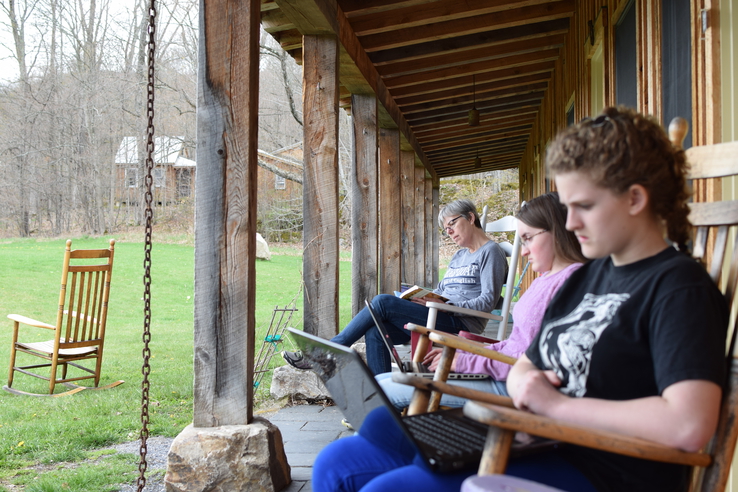
#3 What Does Addiction Mean?
I began the exploration of this topic by considering the different people at my disposal and making a point to utilize the diverse angles from which the concept of addiction is viewed. My search for new perspectives produced ideas and insight from the minds of a Hungarian psychologist, a man from Massachusetts, and a high school student from Middlebury Vermont.
Part One; The Psychology
I began by asking my Aunt Zsuzsa Tolgyesi what was it that made a substance addictive. Her response was;
“I think anything on earth can be addictive. It is not about the substance itself but how people try to avoid to be with their emotions or with themselves.
Most people think that addition is strictly limited to drugs, alcohol, cigarette, work, eating, etc…. These are the most visible additions of course, but anything else can become an addiction. Really anything.
The main feature of the addition is: that you do something in order to avoid/reject your feelings. For example, you feel terrible about your marriage and instead of facing your bad feelings and the situation, you start to do long running training. Finally, you run the marathon. People will celebrate you, and no one will know that the whole accomplishment was driven by addictive psychological tendencies.
So when you avoid your feelings, or avoid reflecting yourself and you do something instead of facing your reality, you are driven by addiction.
And why people avoid their feelings? Because they do not have the power and the coping mechanisms to face and deal with their own feelings.”
After the first question, I could tell I was going to learn a lot during this interview. I found myself particularly refreshed by her non-textbook approach to explaining the concept of addiction.
Question number two asked her to briefly describe some of the characteristic behaviors shared by victims of addiction.
“Addiction for me is a very wide category, hence I would mention internal behavioral patterns such as thinking , internal reactions, etc…
For me addictive people are very similar in their internal reactions like avoiding their feelings as they cannot cope with what they find there, avoiding to be in the present, they can look very strong externally, but have very weak self-power, being very repetitive,”
I then proceeded with the slightly heavier question of; “why is it so difficult to recover from addiction?”
“Well, to continue my previous thoughts, I think addiction is a very very deep psychological and spiritual phenomenon.
It is embedded deeply in your personality and involves your whole being. It is not just a psychological but spiritual problem as well.
At the end, there is the question: who I am? what is the goal of my life? The questions/problems, addictive people have to answer and deal with are the toughest questions to be answered.
I think, on earth nearly everyone is addictive to some extent. Even if someone has a happy and well-organized life, which seems very successful from the outside. When you really and deeply look at people, you realize that everyone is struggling with addictions to some extent.
It is hard to recover because for that you have to change your whole being, change your life, be in the present, be with your feelings, find the meaning of your life. This is very very though…. Not everyone can reach this point.”
The notion that everyone is addicted to something on some level I found very intriguing. I found this especially valuable given that this topic is most commonly discussed and portrayed from a specific angle. As I received her responses I felt more and more like I was getting a glimpse of the bigger picture.
what are some common methods for treating addictive behaviors?
“Psychotherapy, spiritual teaching, meditation, etc….
Of course, all of these can be addictive as well…. If you use them to avoid your bad feelings and get away from yourself even psychotherapy and spiritual practices are addictive”
I had never heard that point of view and at this time in the interview, I got really excited because I could sense that I was about to delve into a topic that would change my entire world view. I had already been experiencing whole new levels of perception just four questions in!
What are the long-term effects on the individual? families? the community?
“Kati, as you see I am not sharing the usual vision on addiction. I think I see it more broadly.”
“The long-term effects can be very wide: from death to just being unhappy (most of the times without even realizing it), wasting your life and not using the time you have here on earth”
“I think most people are just wasting their lives instead of doing something really valuable. They are stuck in bad marriages, stuck in meaningless work, stuck in gray life. Me, myself is not an exception, unfortunately … But I at least try”
I think that Zsuzsa’s response to this one was very important because the only time we ever really have a conversation on addiction we are only focusing on drugs or behaviors that make someone incompatible with the majority of society. We never address the little things, the seemingly normal things, the things that we ourselves don’t always recognize as destructive but are controlling us and keeping us living a”gray life.” I understand that hard drugs are on the opposite side of the spectrum from the small, everyday addictions, but I think both are important to acknowledge when approaching the topic of addiction in a holistic way.
Part two; En Route to Their Horrific Ending
The second person I reached out to was my uncle and very close friend, Ken Grief. Something to know about Ken is he is very charismatic and makes friends very easily. I was previously aware that within his large and diverse group of friends there existed some tragic stories relating to severe addictions. I decided to ask him some questions to gain the perspective of an outsider with front row seats to this issue.
I started with the question of; “what is your personal definition of addiction?”
“Addiction to me means the inability to cease an obviously detrimental action which harms you and all those around you. Despite clearly needing to stop or change one’s behavior it continues regardless of the obvious damage and destruction one is causing directly and indirectly through their own actions.”
He told me of two recent and one long-term situation as well as the story of an old classmate.
“First is the long-term alcoholism of a close relative. The issue has been accommodated by family members and friends and become seemingly acceptable- or at least tolerated. The effects have been more on personal health than the family in general although the person is now 90 so an early death is not the concern. The need has been predominantly based on self-medication for physical pain sustained through war injuries during active military service. However, there is also a social element in play too. It has become a challenge with age as the ability to remain discreet and to manage alone without assistance has waned and the use of alcohol has become much more obvious and apparent as an issue. Any interference by loved ones is met with instant hostility and defensiveness which has succeeded in the individual being left alone much of the time further exacerbating the social isolation element in the alcohol use.”
It’s the classic story of destruction; the abuse of substance pushes people away and dissolves relationships, which leads to more substance abuse to cope with loneliness and dysfunctional relationships.
“The second addiction experience that I think of is a close neighbor and fellow colleague at work whose young son recently died of a heroin overdose at only 22. He was a local lifeguard at our neighborhood lake and was entering back into military service after having served for a couple years. His addiction and drug use began while serving the military. Apparently, the boredom, surprisingly easy access to substances, exposure to other young men more familiar with drug use and ample down time were major factors. He had been through some rehab programs but failed to quit. His drug use was known and an issue he was struggling with but took him before he could recover.”
“The last circumstance was the most devasting and closest to me personally. My business partner and very close friend’s brother-in-law was a long time heroin user. He drained money, time and emotion from all those around him and ended his life locked in a CVS bathroom where his body was found around 9-10 hours after he entered to shoot up. They could only estimate his time of death for his elderly parents and family. He was an expert at blame and deflection and was never able to see his own fault or responsibility in much of life. His addiction became a shared connection with his son who is now also a heroine addict and still using to this day at 21 years old. Unemployed, dependent and stealing from his aged parents was the life he was left with until dying of a likely deliberate overdose at 52. His son is still using heroin in his grandparent’s basement with no income, limited education, and low future prospects. Both live(d) in denial.”
Those last two stories are particularly difficult to digest and unfortunately are nowhere close to being unique. It’s the same story of feeling the dark low points of life and looking for a friend in a substance.
“As far as the lingering effects of addiction the negative impacts are seemingly neverending. The burden on elder care for an alcoholic both on adult children and an aging wife are difficult to contend with and unfairly overwhelm those who care for you. “
“The obvious devastation of losing your son at the age of 22 when adult life is supposed to be just beginning and witnessing the complete loss of the love and commitment you have poured into raising another human being is unthinkable and carries a life long sentence of shame guilt and nearly unbearable sadness.
This devastating loss does not change much when even at 52- 30 years later than the 22 year old overdosing your adult child is so lost to addiction that you are reduced to being forced to merely witness the slow painful destruction and inevitable death of someone you love taking your money and emotions en route to their horrific ending.”
I thought this last sentence was particularly moving as it briefly yet powerfully illustrates the course that many addictions run.
The fourth story tells of this course being intercepted miraculously.
“A pretty young girl who was two years ahead of me in grade school in a wealthy suburban enclave wound up on the streets as a prostitute in New York City. Upon discovery that she had been impregnated by one of her customers she was able to have that be a wake-up call to bring her back to her loving parents, go through Rehabilitation to stop using immediately to prevent damage to her fetus and made her responsibility and desire to raise her healthy son the focus and priority of her new life. Her claim for beginning drug use was as simple as low self-esteem and a lack of self-worth driving her to a series of bad choices that left her with a few other options than selling herself to feed her habit. However, she remains clean today and has written about her struggle and tried to reach out to others who suffer from some of the challenges before they go as far and as lost as she was.”
The main message I take away from this story is that the choice to start can be as simple or as mundane as boredom, but the decision to stop takes large amounts of strength, love, passion combined with self-awareness. To start is easy, but to stop takes a real test of one’s human capabilities.
Listening to Ken’s stories helped me to see the patterns of addiction more vividly. The combination of the psychology of addiction and the raw stories of life and death complemented and enhanced each other, together providing a more visible representation of the topic.
Part three; In The Mind of a Student
For the third point of view, I asked some questions to a friend of mine who lives in the same area of Vermont and goes to the same school as I do to see what I could learn from someone very close to home.
I began in a similar way as I began the previous investigations; by asking how she defines addiction;
“I’d say addiction is the obsessive need for anything that makes you lose control over yourself. That includes like logical processes of the brain and most of the time people want to forget their problems so they get hooked on something that will take their mind off of it”
I then asked about the role that addictive substances played in school, home, and social environments.
“Well, you already know that my mom isn’t in my life and wasn’t ever really there even when physically present earlier in my childhood. So already it has affected me in almost every deeper aspect of my life. Also, my step-monster smokes and can’t function without cigarettes and in very logical ways I believe addiction is like a crutch for a bigger problem at hand. But back to the mom story: addiction changes people. It can either alter the person or completely vanquish them. Everyone around that person who knows them can say addiction not only consumes the user but the people nearest to them.”
I can see examples of this consuming of the people closest to the user from the previous interview. The bigger picture is coming into focus.
“In school, they go down to the biology and anatomical parts to the complications in a larger community. No one really knows the struggle of addiction unless it impairs or comes into contact with their own lives. Experience is something schools cannot give their students unless they go out of their way to do so. With drugs, I don’t think they’ll ever condone that.”
Hehe, I don’t think it will be condoned either. So in that case students are stuck with either just the impersonal scientific side to addiction or the far too personal, destructive education from outside of school,
Curious, I asked what her personal feeling was towards drugs in general;
“The feeling I have at first is fascination oddly. Really to me, drugs are a way to escape reality. The reasoning behind why people use them varies. It’s always been human natural to find things to take them away from the real world. For many centuries it’s been going on. If people didn’t get hurt by drug use then it’d probably not even be a top priority to stop but since it is it’s obviously something the law takes interest in. I just find it confusing in an interesting way when I hear about people using them.”
“Drugs affect people differently in various ways for lots of reasons and in my particular case, I’ve become numb to stupid people who find it necessary to resort to that kind of abuse. Marijuana is a gray area though and it’s not like other drugs which have their own categories which is strange to me.”
She brings up a valuable point here that not all drugs are created equal. Each abused substance comes with its own problems and stories. This is one of the main reasons why there are so many layers to the subject of addiction.
I walked away from each interview with a sense of further enlightenment and open-mindedness. The intense intricacy of the topic has become quite apparent to me, but I feel ready, armed with new perspectives and knowledge, to immerse myself in new discoveries and create a positive impact on the world of addiction.


 Previous Post
Previous Post Next Post
Next Post







Kati–Intense interviews. I was so moved by each person’s stories and personal understandings of addiction. One of the things that really stuck with me after reading was the complexity of emotions for loved ones; there is so much sadness and grief, but that is balanced by anger and betrayal. This must be a really difficult combination to live with and hold onto as they are trying to navigate the addiction with their loved one. There is such a societal stigma around addiction–a disgust with the addicts. What your aunt wrote about underlying tragedies and difficulties helps to humanize the victims, because it seems that all of your interviewees, particularly the first two, see the victims within the terrible behaviors.
I wonder about these stories. I was moved by the words of your peer, and the anger he/she clearly has. I’m not sure I have heard the stories of the children affected by addiction, and I wonder if that is a direction you might consider. I know there is a term called “parentification,” which is when children are forced by circumstances to become the parents in a relationship. This can be damaging for a variety of reasons, and is all too common in families with addiction. Might be interesting to explore this and what can be done to help these children make sense of their worlds.
Thanks for such a thorough post. I look forward to watching this project evolve.
Thank you for such a thoughtful response!
I still haven’t quite decided from which angle I will tackle this subject since it is so broad and profound but your suggestion of parentification really got me thinking. I’m aware that this subject has been depicted many many times in various different ways which is why I want to challenge myself by taking a less conventional route with it. I was thinking of looking at addictive behaviors as a whole and not just in relation to drugs but I’m really liking that parentification idea, I know of several real life examples of it already and I think that could be a topic with a lot of potential.
Dear Kati,
Having experienced addiction across generations in my family, I found the responses of your aunt, your neighbor, and your friend moving and deeply engaging. The subject is broad and profound: I like Emily’s suggestion that the stories of children affected by addiction might be a good option. These children are mostly silent, I think, but their experience has profound implications for them as individuals and for all of us.
It’s early to think of outcomes, purposes, and products, but I’m struck by the dramatic potential of your interviews. The distinctive voices and themes pop.
I’m writing to you from Clemson, SC, about a month after a summer at Bread Loaf Vermont, where I’ve taught for many years and where the What’s the Story? was showcased for the community early in the summer. I’m 85 with 15 great-grandchildren.
Life-long learner happy to be part of 2016 and 2017 What’s the Story and to be reading and responding to your evolving inquiry.
Dixie
Thank you, I’m glad the interviews I conducted were effective and that you see potential in my work! The two angles of this issue I’m considering focusing on are; the recovery process, what strategies do and don’t work, or the problem as it affects young people in families. I’m so glad you think I’m heading in a good direction.